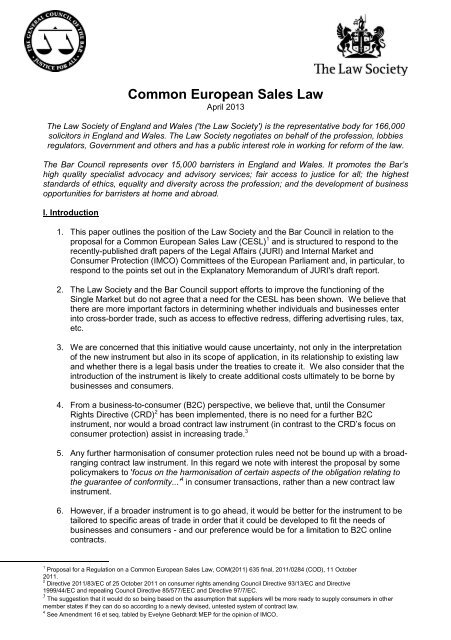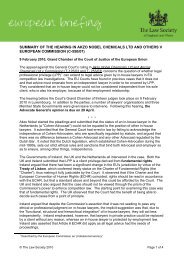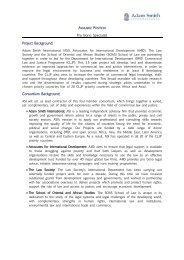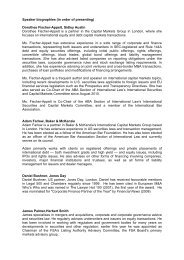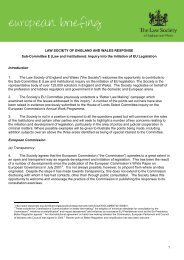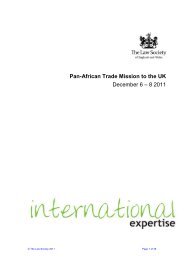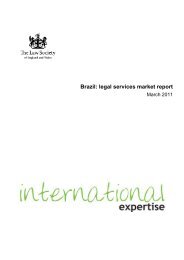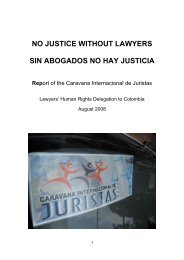Common European Sales Law - The Law Society International ...
Common European Sales Law - The Law Society International ...
Common European Sales Law - The Law Society International ...
You also want an ePaper? Increase the reach of your titles
YUMPU automatically turns print PDFs into web optimized ePapers that Google loves.
<strong>Common</strong> <strong>European</strong> <strong>Sales</strong> <strong>Law</strong><br />
April 2013<br />
<strong>The</strong> <strong>Law</strong> <strong>Society</strong> of England and Wales ('the <strong>Law</strong> <strong>Society</strong>') is the representative body for 166,000<br />
solicitors in England and Wales. <strong>The</strong> <strong>Law</strong> <strong>Society</strong> negotiates on behalf of the profession, lobbies<br />
regulators, Government and others and has a public interest role in working for reform of the law.<br />
<strong>The</strong> Bar Council represents over 15,000 barristers in England and Wales. It promotes the Bar’s<br />
high quality specialist advocacy and advisory services; fair access to justice for all; the highest<br />
standards of ethics, equality and diversity across the profession; and the development of business<br />
opportunities for barristers at home and abroad.<br />
I. Introduction<br />
1. This paper outlines the position of the <strong>Law</strong> <strong>Society</strong> and the Bar Council in relation to the<br />
proposal for a <strong>Common</strong> <strong>European</strong> <strong>Sales</strong> <strong>Law</strong> (CESL) 1 and is structured to respond to the<br />
recently-published draft papers of the Legal Affairs (JURI) and Internal Market and<br />
Consumer Protection (IMCO) Committees of the <strong>European</strong> Parliament and, in particular, to<br />
respond to the points set out in the Explanatory Memorandum of JURI's draft report.<br />
2. <strong>The</strong> <strong>Law</strong> <strong>Society</strong> and the Bar Council support efforts to improve the functioning of the<br />
Single Market but do not agree that a need for the CESL has been shown. We believe that<br />
there are more important factors in determining whether individuals and businesses enter<br />
into cross-border trade, such as access to effective redress, differing advertising rules, tax,<br />
etc.<br />
3. We are concerned that this initiative would cause uncertainty, not only in the interpretation<br />
of the new instrument but also in its scope of application, in its relationship to existing law<br />
and whether there is a legal basis under the treaties to create it. We also consider that the<br />
introduction of the instrument is likely to create additional costs ultimately to be borne by<br />
businesses and consumers.<br />
4. From a business-to-consumer (B2C) perspective, we believe that, until the Consumer<br />
Rights Directive (CRD) 2 has been implemented, there is no need for a further B2C<br />
instrument, nor would a broad contract law instrument (in contrast to the CRD‟s focus on<br />
consumer protection) assist in increasing trade. 3<br />
5. Any further harmonisation of consumer protection rules need not be bound up with a broadranging<br />
contract law instrument. In this regard we note with interest the proposal by some<br />
policymakers to 'focus on the harmonisation of certain aspects of the obligation relating to<br />
the guarantee of conformity...' 4 in consumer transactions, rather than a new contract law<br />
instrument.<br />
6. However, if a broader instrument is to go ahead, it would be better for the instrument to be<br />
tailored to specific areas of trade in order that it could be developed to fit the needs of<br />
businesses and consumers - and our preference would be for a limitation to B2C online<br />
contracts.<br />
1 Proposal for a Regulation on a <strong>Common</strong> <strong>European</strong> <strong>Sales</strong> <strong>Law</strong>, COM(2011) 635 final, 2011/0284 (COD), 11 October<br />
2011.<br />
2 Directive 2011/83/EC of 25 October 2011 on consumer rights amending Council Directive 93/13/EC and Directive<br />
1999/44/EC and repealing Council Directive 85/577/EEC and Directive 97/7/EC.<br />
3 <strong>The</strong> suggestion that it would do so being based on the assumption that suppliers will be more ready to supply consumers in other<br />
member states if they can do so according to a newly devised, untested system of contract law.<br />
4 See Amendment 16 et seq. tabled by Evelyne Gebhardt MEP for the opinion of IMCO.
7. We believe that including B2C and business-to-business (B2B) contract law in one<br />
instrument would cause confusion due to the differing characteristics and approaches of<br />
these areas of contract law. Taking into account the instrument's development, based<br />
largely on B2C contractual principles, practitioners are concerned that the approach<br />
proposed is not suited to B2B transactions.<br />
8. As an alternative approach, we continue to support the idea to develop some EU standard<br />
terms and conditions that could be used to assist parties in drafting cross-border contracts<br />
in a B2C context. We are not convinced that the current approach of drafting standard<br />
forms to be used in conjunction with the CESL will be helpful as there will be no<br />
jurisprudence relating to the CESL underlying such contracts and so less clarity for<br />
contracting parties.<br />
II. Issues<br />
9. <strong>The</strong> <strong>Law</strong> <strong>Society</strong> and the Bar Council have carefully considered the changes proposed in<br />
the draft report and recognise that a number of improvements have been made. <strong>The</strong>se are<br />
welcome.<br />
1. Structure<br />
10. We welcome the change to integrate the definitions section with the CESL articles in the<br />
same consolidated document.<br />
2. Scope<br />
Distance/online contracts<br />
11. We welcome the restriction of the scope to distance-contracts. We would prefer any<br />
eventual instrument to be restricted to B2C on-line contracts. This would allow the<br />
instrument to be tailored and simplified as, in general, online contracts do not allow for precontractual<br />
negotiations. Distance-contracts can take many forms, including telephone<br />
sales and hybrid arrangements: these are more complex to provide for.<br />
EC text (Art 5(1) Reg)<br />
<strong>The</strong> <strong>Common</strong> <strong>European</strong> <strong>Sales</strong><br />
<strong>Law</strong> may be used for:<br />
AM 55: Current JURI text<br />
<strong>The</strong> <strong>Common</strong> <strong>European</strong> <strong>Sales</strong><br />
<strong>Law</strong> may be used for distance<br />
contracts, including online<br />
contracts, which are:<br />
Our suggested text<br />
<strong>The</strong> <strong>Common</strong> <strong>European</strong> <strong>Sales</strong><br />
<strong>Law</strong> may be used exclusively<br />
between traders and<br />
consumers for online<br />
contracts, which are:<br />
12. In addition, it is clear that there are some 'loopholes' to the scope, which are likely to give<br />
rise to uncertainty. For example, Amendment 56 provides that "[t]he <strong>Common</strong> <strong>European</strong><br />
<strong>Sales</strong> <strong>Law</strong> may also be used for contracts [sales contracts, contracts for the supply of<br />
digital content or related service contracts]... where the parties conducted negotiations or<br />
took other preparatory steps with a view to the conclusion of the contract, using for all those<br />
steps exclusively means of distance communication, but where the contract itself was not<br />
concluded by distance communication". This provision should be deleted. We believe that<br />
any such extension as this is undesirable, and that the instrument, if it is to go ahead,<br />
should be limited with certainty to B2C contracts concluded online.
Limitation to cross-border contracts<br />
13. We support the decision of the rapporteurs to leave in place the restriction to cross-border<br />
contracts.<br />
14. We believe that the most appropriate approach may be to see first whether any final<br />
instrument is able to operate successfully in a cross-border context and, if so, for Member<br />
States to then be able to consider introducing it into their domestic systems. <strong>The</strong> aim of<br />
increasing trade across borders has been the key justification for the initiative: extending<br />
the initiative to domestic contracts, at least in the first instance, would overreach this and<br />
raise questions in relation to competence and proportionality.<br />
B2C and B2B contracts<br />
15. <strong>The</strong> current scope proposed is for an instrument covering both B2C and B2B contracts. In<br />
our view, commercial contract law and consumer contract law have diverged so<br />
significantly in recent decades, in large part as a result of EU initiatives in the consumer<br />
protection field, that it is not appropriate to include both B2C and B2B transactions in the<br />
same instrument. We believe that, if the CESL proceeds, B2B contracts should be<br />
removed.<br />
16. B2B contract law focuses on freedom of contract and certainty; B2C contract law focuses<br />
on fairness, that fairness being determined by the law. <strong>The</strong> merging of consumer and<br />
business law in the same instrument tends to push what is appropriate for consumers in the<br />
direction of business and vice versa. Whilst B2C contracts need to offer protection to the<br />
consumer as the weaker bargaining party, B2B contracts should be facilitative enabling<br />
commercial parties to strike a bargain based on free choice. 5<br />
Alternative approach in relation to consumer legislation<br />
17. In contrast to the CESL, the CRD proposal took a much narrower approach in relation to<br />
contract law rules. <strong>The</strong>re seems no clear justification for the broad scope of the current<br />
proposal, which covers a range of general contract law components (for example, formation<br />
of contract and rules on interpretation) given that it is possible to incorporate standardised<br />
consumer protection rules into the different systems. As outlined above, any further<br />
harmonisation of consumer protection rules need not be bound up with a broad-ranging<br />
contract law instrument. We encourage policymakers to consider an approach based on<br />
this.<br />
Focus on sale of goods and mixed/linked contracts<br />
18. <strong>The</strong> CESL is designed for sale of goods and some related services contracts. We would<br />
favour a limitation of the scope to sale of goods contracts (which have different<br />
characteristics and remedies than those appropriate for services contracts). At the very<br />
least, if related services are to remain within scope, in order for transactions to fall within<br />
the scope of the CESL, they should relate predominantly to the sale of goods.<br />
5 From a B2B perspective, whilst we support initiatives to stimulate greater cross-border trade involving SMEs, we have concerns that<br />
the justification used for the proposal, that smaller businesses require protection, is too simplistic. Firstly, it is not true that small<br />
business entities are always in a weaker position. Some are and some are not, depending on a range of different factors including who<br />
they are negotiating with, the experience of the parties concerned, the type of business, the level of need of the buyer, etc. Secondly,<br />
the protective rules in the text are not confined to SMEs (see for example Article 51 of the CESL on unfair exploitation). We further do<br />
not believe that weakness on its own in a commercial context is a ground for requiring protection. Surely an additional justification is<br />
required before protection is granted to one party in a B2B context because most contracts will have a weaker and a stronger bargaining<br />
party (and who this is may change during the course of negotiations).
19. We note the extension to mixed/linked contracts with a credit element. Practitioners have<br />
warned, in this regard, that there should be a thorough consideration of the interaction<br />
between the CESL and the current EU and domestic consumer credit regimes. It is<br />
possible that this addition could give rise to unnecessary legal uncertainty.<br />
20. As a general comment, in both a B2C and B2B context, mixed and linked contracts can be<br />
complex. <strong>The</strong>re is also an infinite variety of such contracts, since the current draft does not<br />
limit in any way the types of contract which may be linked to contracts for sale of goods, for<br />
the supply of digital content or a related service contract. Greater clarity of drafting would<br />
be required We would be happy to assist with such drafting if, contrary to our primary<br />
view, it is thought desirable to include any mixed purpose contracts.<br />
3. Relationship with the Rome I Regulation 6<br />
21. Following the publication of the JURI Working Document, 7 the <strong>Law</strong> <strong>Society</strong> agreed with the<br />
rapporteurs that the relationship between the CESL and Rome I required clarification.<br />
Whilst we appreciate the effort that has been made in this regard, neither of us think that<br />
the additions proposed in the JURI draft report to the recitals to the instrument are sufficient<br />
to achieve this. We believe that the legal uncertainty regarding the relationship will either<br />
need to be resolved by a change to Rome I itself or through a ruling of the Court of Justice<br />
of the <strong>European</strong> Union.<br />
22. A key justification for the CESL appears to be the requirement under Article 6(2) of Rome I<br />
for businesses, when selling (and directing activities) to a consumer in another Member<br />
State, to comply with the mandatory rules of consumer protection in the Member State<br />
where the consumer is habitually resident. <strong>The</strong>re are differing views on how much of a<br />
problem this in fact poses.<br />
23. <strong>The</strong> key attraction of the B2C CESL instrument therefore appears to be its perceived ability<br />
to insert into each Member State's law an optional identical set of mandatory consumer<br />
protection rules that businesses could choose to comply with thus circumventing the current<br />
perceived difficulty with Article 6(2) of Rome I. <strong>The</strong> approach is complicated, novel and<br />
untested and there is uncertainty among legal practitioners as to whether this approach<br />
succeeds. Indeed, it is not clear to some practitioners how the CESL would even become<br />
the second national contract law for these purposes.<br />
24. <strong>The</strong> <strong>Law</strong> <strong>Society</strong> has previously given the example of a German retailer, wishing to sell to a<br />
consumer in England within the scope of Article 6(2) of Rome I, who provides that the<br />
contract is governed by German law and the CESL. A court would first need to decide what<br />
the governing law is and would conclude that it was German law according to the parties'<br />
choice of law under Article 6(2) of Rome I. As a result, the consumer would retain the<br />
protection of English mandatory consumer protection law also provided for under Article<br />
6(2) of Rome I. <strong>The</strong> CESL is chosen as a part of a national governing law (in this example,<br />
German law). If that governing law is not the law of the consumer's state of habitual<br />
residence, Article 6(2) of Rome I requires that the consumer should continue to benefit from<br />
the mandatory protection of the rules of the state where he or she is habitually resident. In<br />
these circumstances, it is unclear to some practitioners why the protection provided by<br />
Article 6(2) of Rome I would be the protection given by the CESL. It seems to depend upon<br />
the parties having chosen not only German law and the CESL that exists as part of German<br />
law, but also having opted through their choice of German law for the CESL that exists in<br />
English law.<br />
6 Regulation (EC) No 593:2008 of 17 June 2008on the law applicable to contractual obligations (Rome I).<br />
7 Working Document on the proposal for a Regulation of the <strong>European</strong> Parliament and of the Council on a <strong>Common</strong> <strong>European</strong> <strong>Sales</strong><br />
<strong>Law</strong> (COM(2011)0635 – C7-0329/2011– 2011/0284(COD)), 8.10.2012.
25. It is also not clear whether ultimately the CESL will be viewed as EU law or national law<br />
and what its relationship will be with existing instruments including Rome I and the CISG.<br />
<strong>The</strong>re is much debate on how parties could effectively choose CESL in the light of Article<br />
6(2) of Rome I in a B2C context and the existence already of an opt-out regime under the<br />
CISG in a B2B context.<br />
4. References to national law<br />
26. <strong>The</strong> <strong>Law</strong> <strong>Society</strong> and the Bar Council welcome the initiative of the rapporteurs to outline the<br />
key areas that are within and outside the scope of the CESL. (See JURI Amendments 69<br />
and 70.) <strong>The</strong> CESL is not self-standing. Although the legal issues outside the scope of the<br />
CESL may not arise in every case, each of them is potentially of significant practical<br />
importance, with issues of set-off, agency, capacity to contract, assignment, property law,<br />
tort (especially product liability claims) and concurrent liability regularly arising in sale of<br />
goods transactions and litigated cases. While the draft may be largely sufficient for basic<br />
cross-border sale of goods contracts, it may not be possible to determine in advance when<br />
issues outside of the scope of the CESL will arise.<br />
27. In the event of a dispute, the outstanding issues would need to be resolved by the default<br />
governing rule identified in accordance with Rome I or other conflicts rules. <strong>The</strong><br />
uncertainties about this would be a further disincentive to using the instrument.<br />
5. Good faith and fair dealing<br />
28. <strong>The</strong> <strong>Law</strong> <strong>Society</strong> and the Bar Council recognise that the rapporteurs have sought to engage<br />
with the concerns expressed by us in the past on the inclusion of a principle of good faith<br />
and fair dealing if the instrument were to extend to B2B contracts. However, we remain<br />
unconvinced of the necessity to incorporate an overriding principle of good faith and fair<br />
dealing. This concept is highly subjective and how it is interpreted would depend on the<br />
approach of individual courts. Its inclusion would inevitably create uncertainty and be in<br />
contrast to the approach in a B2B context of providing specific rules which address<br />
demonstrated examples of contractual unfairness or other specific objectionable practices.<br />
We do not think it is necessary and its inclusion creates significant uncertainty from the<br />
perspective of contracting parties.<br />
29. In the attached annex, the <strong>Law</strong> <strong>Society</strong> had outlined some of the concerns concerning the<br />
<strong>European</strong> Commission's proposed wording, in particular, the requirement for "consideration<br />
for the interests of the other party" which could create difficulties in a commercial context.<br />
We do not think, however, that the inclusion of wording that "excludes an intention the only<br />
purpose of which is to harm" addresses the concerns because in this case a party would be<br />
able to argue that, even if their principal purpose was to harm, they also had another,<br />
subsidiary, motivation. An alternative approach would be to address this as a specific<br />
objectionable practice.<br />
30. We note the proposal that the concept of good faith and fair dealing could be limited to the<br />
function of a shield (i.e. "precluding a party in breach from exercising or relying on a right,<br />
remedy or defence"). Whilst it may be said that this limits the objections that may be raised<br />
to the use of such a concept, since it lessens the importance of the concept in practice, we<br />
question the utility of this approach. Where there has been a lack of good faith, then there<br />
are often remedies given by other areas of the law; a degree of overlap will create<br />
uncertainty. Moreover, the width of the concept, which appears to be a free standing one,<br />
will give rise to further uncertainty. <strong>The</strong> discretion which is inherent in the draft (“breach<br />
may preclude a party from relying”) means that a party will be unsure of its contractual<br />
rights, and will mean that definitive advice will be more difficult to give to parties.
31. From a B2C perspective, we believe that the inclusion of this principle without further<br />
understanding of what is meant beyond the very generic terms of the definition may<br />
discourage businesses from adopting the instrument, as it gives both parties to an<br />
agreement a very broad scope to argue that a party has breached this duty and as such<br />
should be prevented from exercising a right or remedy under the contract. It is very difficult<br />
for traders to show, let alone prove, bad faith on the part of the consumer, particularly in an<br />
online context. 8<br />
6. Remedies of the buyer<br />
32. <strong>The</strong> <strong>Law</strong> <strong>Society</strong> and the Bar Council note that the rapporteurs propose three alternative<br />
approaches for the perceived problem in relation to remedies, namely an imbalance<br />
between the rights of consumer buyers and business sellers. <strong>The</strong>se are (i) "one could<br />
introduce a deadline of 6 months after the risk has passed to the buyer, after the expiry of<br />
which the buyer would have to accept cure..."; (ii) "a requirement could be introduced that<br />
the consumer must give notice of termination within a reasonable time after he first<br />
became aware of non-performance..."; or (iii) "an obligation could be introduced for the<br />
consumer to pay for use in cases where he terminates the contract".<br />
33. Whilst we recognise that significant thought has gone into the alternative approaches, we<br />
are not convinced that any of the options would be fully suitable. However, we welcome<br />
the approach of the rapporteurs in seeking to initiate debate based on the proposed<br />
alternatives, and the pros and cons of each.<br />
34. In the case of remedies, if despite our concerns (see section 8. below) digital content<br />
remains in scope, we would see digital content as a separate category for which different<br />
remedies should be able to apply due to the different nature of the product. For example,<br />
we would not wish to support immediate termination in the case of digital content. <strong>The</strong><br />
consumer should be required to first demand repair/replacement before being allowed to<br />
request termination and a refund. Some practitioners have also expressed concern that<br />
providing the current choice of remedies, in the case of digital content for which only a<br />
micro-payment (or even no payment at all) is exchanged, could be potentially onerous for<br />
businesses to provide for.<br />
7. Restitution<br />
35. Please see the <strong>Law</strong> <strong>Society</strong>'s previous comments in the attached annex (final page).<br />
8. Digital content and cloud computing<br />
Digital content<br />
36. At a conceptual level, it may be logical to include digital content within the CESL.<br />
Nevertheless, we can see a number of problems with incorporating digital content into the<br />
instrument. <strong>The</strong> approach to digital content cannot be considered in isolation from a host of<br />
interrelated factors, which include copyright law, data protection, payment methods,<br />
technological changes, online security and marketing rules as well as the issue of definition<br />
and categorisation. We are not convinced that digital content should be included at this<br />
stage. One important concern is the distinction between “digital content” and “goods”. At<br />
times the approach appears confused. It is strongly arguable that concepts relating to the<br />
sale of goods are not apt for the sale of digital content (which normally takes the form of a<br />
copyright licence).<br />
8 Though some in-house counsel have also pointed out that the supplier having to assert bad faith is not a good approach for the<br />
consumer's perception of a brand and many traders will therefore operate a rule that the 'customer is right'.
37. Digital content is often viewed as sui generis in its legal character while cloud computing is<br />
often offered as a service. <strong>The</strong>re is a concern that an instrument designed to cater for sale<br />
of goods would be not suitable for the rapidly-evolving fields of digital content and cloud<br />
computing. In addition, some practitioners have raised concerns that any approach<br />
adopted in CESL is likely to be followed by other EU instruments in the future when a more<br />
innovative approach could be adopted from the outset.<br />
38. If there are problems with online sales of digital content they seem to mostly emanate from<br />
consumers not being able to access the right information about what and who they are<br />
purchasing from and whether they will be able to get a problem resolved if one arises. In<br />
other words, the main issues are ones of transparency, good customer complaint handling<br />
and a lack of enforcement of existing regulations. <strong>The</strong> CESL will not be able to resolve<br />
these perceived problems.<br />
39. <strong>The</strong> <strong>Law</strong> <strong>Society</strong> and the Bar Council would support further consideration of the various<br />
alternative approaches which could be adopted vis-à-vis digital content (and cloud<br />
computing). 9<br />
40. Finally, clarification is needed over the relationship between the proposed change to enable<br />
remedies to be available in the case where "...digital content is not paid for with money, but<br />
e.g. with personal data" and the proposed Data Protection Directive, which we understand<br />
provides for a right to be forgotten. A monetary remedy when the consumer has<br />
exchanged personal data is problematic and reinforces the sui generis nature of much of<br />
the consumer activity in this area and the inappropriateness of applying goods laws to<br />
digital purchases. (<strong>The</strong>refore a limited consumer remedy like the „the right to be forgotten‟<br />
proposed in the Data Protection Directive may be the most appropriate alongside rights to<br />
repair and replace any content the consumer received through the contract they entered<br />
into.)<br />
Additional thoughts on cloud computing 10<br />
41. <strong>The</strong> <strong>Law</strong> <strong>Society</strong> and the Bar Council view the provision of cloud computing space and<br />
related services to be distinct from other services. Cloud computing should not be treated<br />
in the same way as digital content (and we believe that neither of these categories are<br />
appropriate to be included within the CESL instrument, designed pre-dominantly for the<br />
sale of goods). It is sensible to separate digital content from the provision of storage in a<br />
cloud (a service). Cloud computing would attract the same remedies as for a service,<br />
whereas digital content might require a different approach.<br />
42. Moreover, we note the uncertainty as to what is meant by “cloud computing”. If, despite our<br />
concerns, it remains in scope, we consider it very important for a definition to be included.<br />
<strong>The</strong> provision of related services, such as maintenance and repair is conceptually different<br />
to the concept of storage (i.e. within a cloud). (See Amendment 41.)<br />
43. We also note that other initiatives are under way to promote cloud computing; for example,<br />
the <strong>European</strong> Commission‟s data protection initiative partially aims to do this. We would<br />
like greater clarity on the overall approach of the <strong>European</strong> institutions to cloud computing.<br />
9. Prescription<br />
44. Please see the <strong>Law</strong> <strong>Society</strong>'s previous comments in the attached annex (final page).<br />
9 One possible approach might be to have a Directive.<br />
10 Some practitioners have also questioned whether it would be better to introduce some amendments to the E-commerce Directive<br />
relating to online contracts, rather than address cloud computing in this instrument.
10. Flanking measures<br />
Database<br />
45. With regards to interpretation, it is clear from the opening provisions that no domestic legal<br />
concepts or principles should be read into the CESL text. Such an aspiration is more easily<br />
stated than achieved as all judges and legal practitioners are inevitably the product of their<br />
education and experience, making divergences in interpretation, with the resulting<br />
uncertainty, likely. <strong>The</strong> proposal for the development of a database of case-law from the<br />
different Member States has been viewed by practitioners as interesting, though it has<br />
raised concerns regarding cost and would rely on judges and lawyers having sufficient time<br />
and resource to consult it and ensure it is up-to-date. Such a practice would be more<br />
valuable if authoritative digests of case-law were produced. Nevertheless, such an initiative<br />
would not be a substitute for greater certainty in the CESL wording and a court in a Member<br />
State would not be bound by the judgment of a court situated in another Member State.<br />
46. We also previously expressed concerns as to how the Court of Justice would be able to<br />
create jurisprudence in relation to the CESL, partly because of the limitations of its<br />
jurisdiction and partly because of the practical demands of the caseload likely to arise from<br />
this instrument. <strong>The</strong> cost of expanding the Court of Justice's role and workload would be<br />
considerable. Parties would encounter long delays even with its current capacity. This<br />
would, we believe, lead to a divergence in the application of the CESL between Member<br />
States as many parties would not elect to appeal to the higher courts in disputes. We do not<br />
think that the proposed case database would negate these difficulties.<br />
Commentary<br />
47. We understand that there are plans to produce a commentary to assist with the<br />
interpretation of the text. While this might have its practical uses, it would also risk further<br />
complexity and the addition of further requirements which are not part of the legislation. As<br />
in the case of a database, a commentary would not be a substitute for greater certainty in<br />
the CESL wording and could not bind Member State courts.<br />
Link with alternative dispute resolution (ADR) and online dispute resolution (ODR)<br />
48. We have strongly supported the initiative to improve access to practical redress in a B2C<br />
context through the ADR Directive and ODR Regulation.<br />
49. Nevertheless, we are not convinced that it would be appropriate to have a stronger link<br />
between the CESL and the ADR initiative. Disputes over small scale transactions rarely go<br />
to court and such disputes could be dealt with through ADR mechanisms, the development<br />
of which we both support. However, this itself may hinder the development of a uniform<br />
jurisprudence, which would be necessary for the effective interpretation and enforcement of<br />
the CESL. Any contract law is closely bound up with the mechanism for its enforcement<br />
through the courts. We agree that “in the absence of clear law to guide settlement<br />
negotiations, there is a risk that any settlement might not be just” 11 .<br />
Standard terms and conditions<br />
50. In its response to the green paper, the <strong>Law</strong> <strong>Society</strong> suggested that some EU standard<br />
terms and conditions could be developed to assist parties in drafting cross-border contracts<br />
11 See Proposal for a <strong>Common</strong> <strong>European</strong> <strong>Sales</strong> <strong>Law</strong> : Making the Proposal simpler and more certain by Sir John Thomas. (Briefing<br />
note to JURI, presented 27 November 2012.)
in a B2C context as an alternative to the CESL. Both the <strong>Law</strong> <strong>Society</strong> and the Bar Council<br />
continue to support this idea. We are not convinced that the current approach of drafting<br />
standard forms to be used with the CESL will be helpful as there will be no jurisprudence<br />
relating to the CESL underlying such contracts and so less clarity for contracting parties.<br />
11. Additional points<br />
Legal basis<br />
51. Any challenge relating to the legal basis may only be resolved by the Court of Justice. <strong>The</strong><br />
<strong>Law</strong> <strong>Society</strong> has previously considered the issue of legal basis, as has the Bar Council, and<br />
is not convinced that the choice of Article 114 TFEU is appropriate for the CESL. (See, for<br />
example, the <strong>European</strong> Co-operative <strong>Society</strong> case (C-436/03).) We believe that this<br />
proposed legal basis will give rise to the possibility of legal challenge (with the<br />
accompanying risk of the instrument being found to be ultra vires). Until this practical<br />
uncertainty is resolved, the instrument will be less attractive to contracting parties<br />
considering using it.<br />
Optional nature<br />
52. If the CESL is ultimately determined to be an alternative system incorporated within the<br />
national laws of Member States, the process for opting for the CESL is understood to be a<br />
"two step" approach of parties needing to select for their contract the governing law of a<br />
Member State and then, within this, the CESL. If this is correct, it raises complications for<br />
parties not familiar with negotiating contracts and also for parties from outside the EU.<br />
What would be the outcome if they tried to select the CESL without an underlying governing<br />
law<br />
53. <strong>The</strong> current proposal requires that a consumer grant consent to the use of the CESL. We<br />
do not think that consumers would be able to make an informed choice concerning the<br />
underlying rules used to govern a contract (even if consumers were provided with<br />
information on the protections offered in the CESL). For an instrument to work practically,<br />
the choice of law would be for the business, with the consumer's true choice being whether<br />
or not to buy the product; however, this would leave businesses in a position of choosing<br />
between different sets of mandatory consumer protection rules (in areas not already fully<br />
harmonised) which, in some cases, could be lower than or different from those already in<br />
place in the consumer's habitual residence.<br />
54. Some practitioners suggest that, if the instrument goes ahead, from a business perspective,<br />
it may be more helpful if a seller could simply elect to import only the mandatory provisions<br />
of consumer protection in the CESL and leave the rest of its contract subject to national<br />
law. Why can the seller not choose to have its existing national law govern the description<br />
of the product, price, method of payment, method of delivery, etc. when these can be<br />
distinguished from the core mandatory consumer protection provisions


